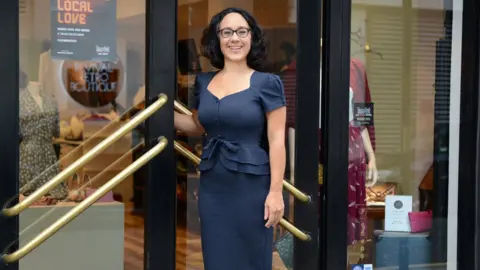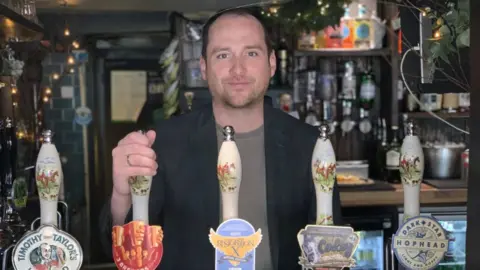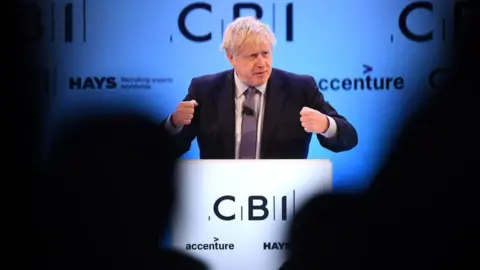Business rates: 'We might as well hand back the keys'
 James O'Hara
James O'HaraJames O'Hara has spent £120,000 converting a disused public toilet in Sheffield into a popular cocktail bar.
But after a more than seven-fold increase in business rates, he says he "might as well hand back the keys".
It's stories like Mr O'Hara's that elevated the subject of business rates to take centre stage at the CBI conference on Monday.
Boris Johnson pledged to review the system and Jeremy Corbyn announced plans to reform business rates, which have been blamed for helping create the challenging High Street environment that has led to store closures across the country. The Liberal Democrats have said they would scrap business rates entirely.
'Lack of consistency'
Mr O'Hara says his bar, Public, was "literally a toilet" when he rented it two years ago. It is now a 24-seater cocktail bar with a turnover of about £300,000 a year.
But that transformation has not escaped the attention of the government's Valuation Office Agency (VOA), which sets the value on which business rates are based.
Mr O'Hara's investment has increased the so-called rateable value of the bar from £3,250 a year to £23,750. That's the rent that the VOA thinks Public should be paying.
As a small business, the bar has to pay 49.1% of that rateable value in business rates.
Last year, the bar paid £560 in rates, so Mr O'Hara was shocked to open this year's bill for £7,760.
The businessman, who runs a number of bars in Sheffield, says there is a "complete lack of consistency" in the way that rates are set.
Allow X content?
He says Public, a cosy underground cocktail bar, now has the same rateable value as another one of his other premises, the Great Gatsby, a much larger pub over four floors, which banks around £1.2m a year.
Mr O'Hara says he will appeal against the new rates, and he expects to win. But in the meantime, he could face a court summons if he refuses to pay the higher bill.
He says the difference is "make or break money" for a small business.
That will sound familiar to Rowena Howie - who runs Revival Retro - a boutique in London.
 Revival Retro
Revival RetroHer neighbours shut up shop the same day that an increase in rates was announced in 2017.
Ms Howie hopes she won't have to do the same with her store, but she says that her £55,000 rates valuation makes it "exceptionally hard" to survive as a bricks and mortar retailer.
For her, headline election pledges are of no interest unless the politicians make good on them.
"I'm sick and tired of empty promises," she says.
She says small businesses are the lifeblood of the economy and she warns that it is getting harder to survive on the High Street.
Sean Hughes, who runs The Boot in St Albans, knows the impact of business rate increases all too well.
 Sean Hughes
Sean HughesHe comes from a family of publicans who have turned the city centre pub around since they took it on in 2004.
But the extra money the pub now brings in has pushed up the rateable value, which is currently £103,000, well above the £70,000 they pay in rent for the 600-year-old property.
That puts the business rates bill at about £53,000, a more than three-fold increase on the £17,000 he paid in 2017 when rates were recalculated.
And Mr Hughes complains that he doesn't get much for his money.
He says there are fewer police in St Albans after the local police station was closed, and he pays £9,000 a year to have his bins collected.
'It's not easy'
Not only that, but his dad now has to spend more hours behind the bar because, since the rates increase, they cannot afford to replace their bar manager who left.
"It does make you question whether it's worth it," says Mr Hughes, who works 70 hours a week and has a hand in managing three pubs in St Albans.
He does it because he enjoys working in a social environment and wants to be a part of the local community.
But Mr Hughes says some days he feels more like a tax collector, responsible for paying VAT, national insurance, pension contributions and, now, higher business rates, as well as calculating income tax for employees.
"We're paying all of this for not very much at the end of the year," he says.
That has forced the pub to increase the price of a pint by 50p and Mr Hughes says the price will go up again.
But it is not just The Boot that is suffering.
Mr Hughes says that 15% of pubs in St Albans have closed in the past three years alone - and he knows of another eight of the remaining 49 that are at risk of closure.
And those kinds of statistics have attracted the attention of party leaders, who have made business rates a focus of their campaigns ahead of the forthcoming general election.
 Getty Images
Getty ImagesSpeaking at the CBI conference on Monday, Boris Johnson promised a "big review" of business rates and pledged to cut them further, especially for smaller businesses.
Meanwhile, Jeremy Corbyn said Labour would also reform rates "because we know the damage they're currently doing to our High Streets and communities".
Jo Swinson pitched her party, the Liberal Democrats, as the "natural party of business", because of its opposition to Brexit.
She also promised that a Lib Dem government would focus on small businesses, and replace business rates with a levy on commercial landlords.
Business owners like Ms Howie will hope these are more than just empty promises.
